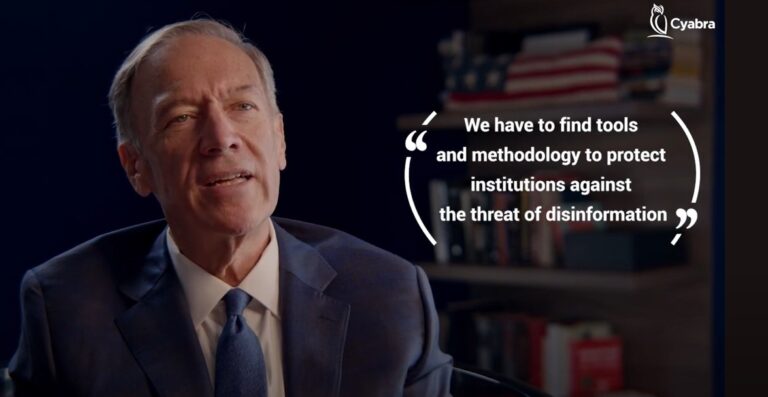What do Balenciaga, Disney, Tom Hanks, and Hillary Clinton all have in common? In the last month, they were all blamed for being part of a conspiracy that keeps snowballing, latching onto any brand or celebrity caught in its path. In its center stands the infamous Jeffrey Epstein, whose ghost still haunts social networks.
Jeffrey Epstein was an American billionaire. In 2019, he was arrested and charged with sex trafficking of minors. Federal investigations uncovered a network of underaged girls that were prostituted by Epstein and his partner.
This was not the first time Epstein was accused or even charged with related crimes. Since 2005, he has been in and out of courts and jails, and his list of crimes included sexual misconduct, sexual abuse, pedophilia, and much more. On August 10th, 2019, while he was awaiting trial in prison, Epstein was found dead in his cell after committing suicide.
Following his death, Conspiracy theorists claimed Epstein was “killed in order to silence him” by one of his many powerful friends and acquaintances, including Prince Andrew, Donald Trump, Bill Clinton, Kevin Spacey, and many others.
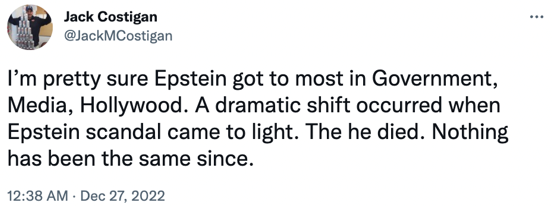
But the real conspiracy theory was yet to come. Actually, it would start trending and buzzing long after Epstein’s death, in the years 2022-2023.
The Client List That (Probably) Never Was
Conspiracy theories were always part of Epstein’s dark story. The billionaire owned a private island in the Caribbean, which locals referred to as “Pedophile Island” and “Sin Island”. Rumors about a secret client list have been spreading ever since Epstein’s original trial, claiming the DA was in possession of a list detailing all of Epstein’s rich and famous clients. Actually, neither the witnesses nor the court approved the existence of such a list (not to be confused with Epstein’s very real “Black Book”). While much of the evidence in the trial was understandably confidential, the alleged secret list was fuel to the fire of those conspiracy theories.
Epstein’s list kept popping up in the years following the trial and his death, but it was last November when it was weaponized by conspiracy theorists to attack luxury fashion brand Balenciaga, following the brand’s provocative campaign (read Cyabra’s article about this case).
But while Balenciaga was the first to be majorly targeted by this certain conspiracy theory, it was certainly not the last. Cyabra analyzed the use of the hashtags #EpsteinIsland and #EpsteinClientList in social conversations during December, and found many other brands, as well as public figures like Oprah Winfrey and Tom Hanks, were mentioned together with those hashtags. 3,500 profiles used the hashtags, 20% of them (meaning 708 profiles) inauthentic, suggesting an organized disinformation campaign, perhaps created in order to attach the hashtag to as many brands as possible, and by that creating the illusion of a wide corruption tale that involves every name an average profile could identify.
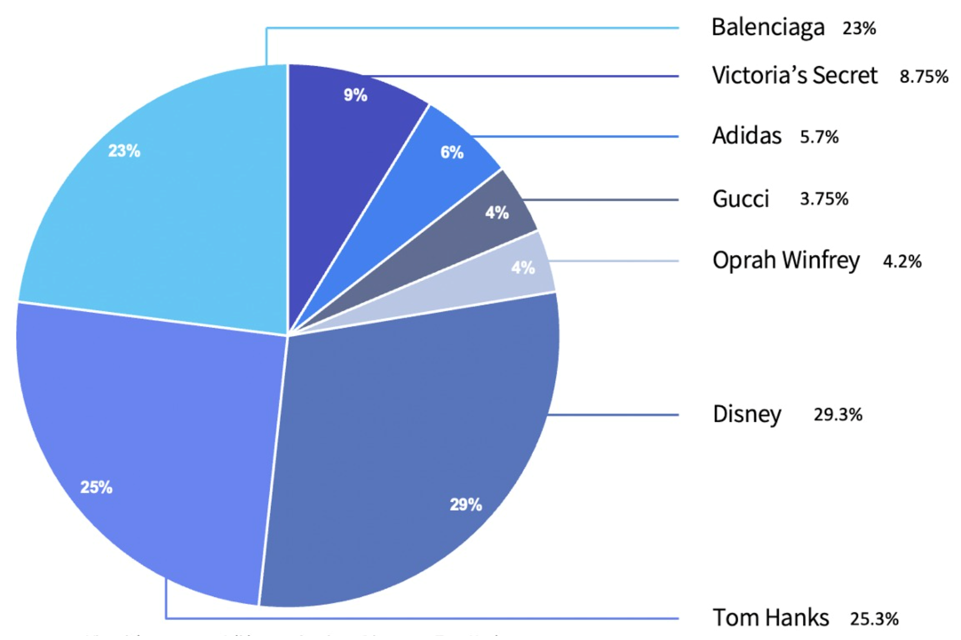
Those 708 fake profiles managed to spread the hashtags, and Cyabra’s scan discovered their content reached an overall of 334,000 profiles on Twitter, causing many social media managers to wake up to thousands of notifications about customers demanding “the truth”.
It’s also interesting to note that most of said fake profiles were not bots, but sock puppets – fake profiles created by real people and operated manually. Creating and managing sock puppets is quite time-consuming, especially when compared to the alternative – buying the services of a bot farm. This manual labor requires a dedicated, devoted, even righteous person, who isn’t scared of putting countless hours into those sock puppets – which, of course, fits perfectly with the average profile of a conspiracy theorist.
Fake Client List Becomes Real Hit List
Anyone who ever tried denying a conspiracy knows that you’re damned if you do, and damned if you don’t. While brands were desperately trying to put out the flames, both on social and on traditional media, the bad actors were coordinating their efforts, attacking brands just around christmas, when their defenses were down. Cyabra’s experts identified a peak of inauthentic activity on December 24-26: 44% of the inauthentic activity was observed during those two days, meaning over 500 posts (!)
Here are some examples of those interactions:
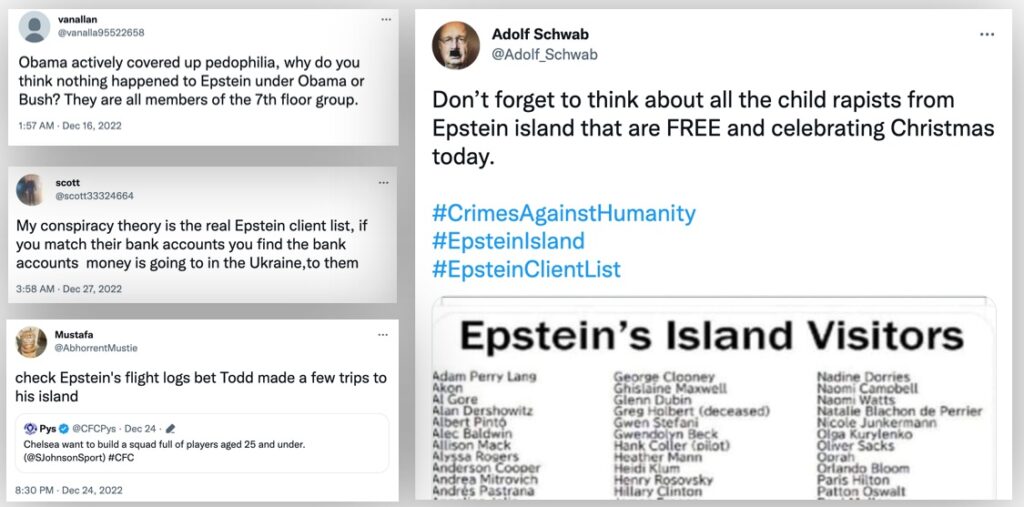
While Epstein is certainly a long-denounced character, names that are now associated with him – the Clintons, for example – have reached a record number of 87% negative sentiment during December. The profiles discussing the Clintons presented supposed proof of their involvement with Epstein, linked them to pedophilia allegations, and marked them as hedonistic and “above the law”. A similar analysis of posts mentioning Trump, who was actually filmed with Epstein on more than one occasion, uncovered only claims that he was in fact not in contact with Epstein and was actually the one who alerted the FBI about Epstein’s island and what was happening there.

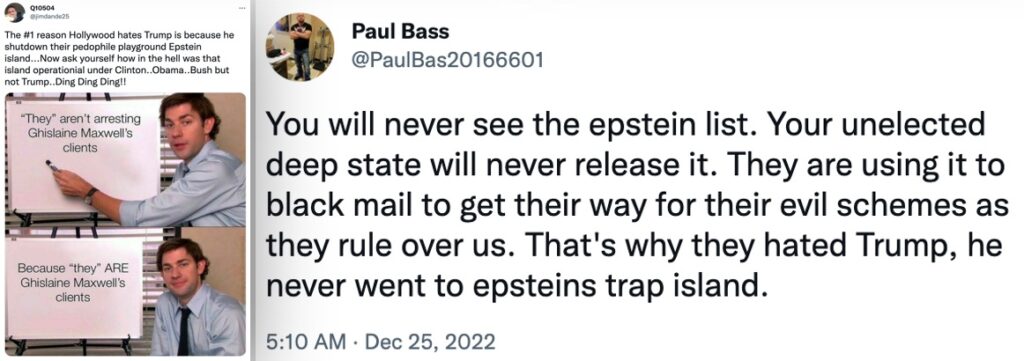
According to the discussions, Epstein’s client list also included Victoria’s Secret’s CEO Les Wexner, Most board members of Balenciaga and Disney, Tom Hanks, Gucci’s and Adidas’ CEOs, Oprah Winfrey, and Hollywood. Yes, all of Hollywood. As well as “the liberals”, “the Democrats” and “the rich elite”.
While those accusations encompassing what might be half of the US population might look ridiculous after reading Cyabra’s analysis and getting a clear picture of inauthentic activity, as well as the timeline and spread of the conspiracy, it’s important to understand that most people on social won’t read those lines, won’t fact-check, and probably won’t even dedicate a moment to Googling those posts. It doesn’t mean they would share them, but it does mean that over time, real people are affected by those disinformation campaigns, especially conspiracy theories that repeatedly pop up on their feeds. Whether it’s Covid conspiracies, Election conspiracies, or the Epstein list – sooner or later, someone you know will believe it. It’s up to us to hold those harmful actors at bay and stop the spread of disinformation.
